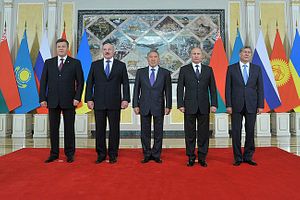After months of delay, all while squeezing substantial loans from Russia, it appears Kyrgyzstan’s leadership has finally resigned itself to the country’s accession to the forthcoming Eurasian Economic Union. Between its substantial reliance on remittances from migrant laborers in Russia, as well as Moscow’s military presence through the country, Kyrgyzstan has always stood as a logical, if unsubstantial, addition to the nascent union. With Kyrgyzstan in tow, the EEU will reach five members when it comes online on January 1, 2015 – even if Kyrgyzstan says it will need five additional years to fully meet all requirements.
Nonetheless, if Moscow was counting on a celebratory mood in sealing Kyrgyzstan’s entry into the EEU – due to come December 23, at latest check – they will likely be disappointed. Kyrgyzstan’s re-export trade with China, a built-in advantage through the country’s World Trade Organization membership, has already seen a significant hit, which only looks set to continue following Kyrgyzstan’s membership. (So long as all extant regulations are enforced – which remains another question entirely.) As Bishkek moves closer to joining the EEU, Kyrgyzstan’s leadership has allowed its distinct lack of enthusiasm slip into its public discourse. According to Prime Minister Djoomart Otorbaev, the country has “no alternative” but to join the Eurasian Union – and that, given the country’ current dependency on Russia’s economic well-being, “we must prepare for the worst.”
Kyrgyzstan President Almazbek Atambayev was even more blunt. “If we give up the accession to the [Eurasian Union], we can face increased risks,” the president said in late October. “No offense, but we’re choosing the lesser of two evils. We have no other option.”
Indeed, for the time being, it appears that Kyrgyzstan – morphing that much further into a Russian client-state in recent months – doesn’t have any other option than to hope for Russian largesse in return for Eurasian Union membership. Moreover, the country is facing greater pressures than simple geopolitical pull at the moment. In addition to the sudden economic slowdown Russia has engendered through the region, Kyrgyzstan is confronted with an energy crisis unlike any it’s seen in years. Because of an abnormally low runoff this year, Kyrgyzstan’s Toktogul Reservoir, the country’s main source of electricity, produced about 25 percent less volume than usual. As such, Kyrgyzstan is facing an estimated electricity shortfall of 2.5 billion kWh this winter. (This shortfall effectively nixes the US-backed CASA-1000 project, which would have stitched together Kyrgyzstan, Tajikistan, Afghanistan, and Pakistan electricity grids – but only if Kyrgyzstan acted as a net exporter.) Kyrgyzstan’s south has also just passed the seven-month mark without access to gas, following Gazprom’s myopic purchase of the Kyrgyz gas matrix and Uzbekistan’s subsequent supply shutoff.
Given Kyrgyzstan’s marked history of energy-spurred restiveness – energy shortages have played roles in both of Kyrgyzstan’s revolutions over the past decade – Atambayev has spent much of the past few months scouring the region for potential electricity sources. Kazakhstan, thus far, has pledged the greatest energy aid, agreeing to supply Kyrgyzstan with 400 million kWh this winter and an additional 1.4 billion kWh in 2015. Turkmenistan has also pledged to supply Bishkek with excess electricity – though whether or not Uzbekistan will allow the transit remains to be seen.
One of the side effects of Kyrgyzstan’s current plight, interestingly, has been a sudden uptick in regional comity. Atambayev not only cited Kazakhstan’s “handsome gesture of goodwill made by the friendly state,” but also publicly appreciated the “fraternal feelings” of Turkmenistan, as well as their “generosity and magnanimity.” In a region as lacking in “fraternal feelings” as Central Asia, a bit of external support for Kyrgyzstan’s looming energy shortage – and some public gratitude from Bishkek – is a welcome change.

































